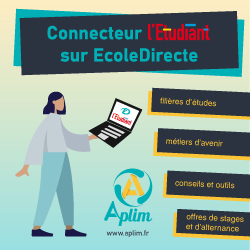
Growing Up DigitalStudents' digital skills may be overrated, according to Nathalie Tingry, a researcher in youth and digital technology.
Your research questions the idea that digital natives are naturally comfortable using technology. Why?
As technology progresses, the human brain adapts. Evolution has equipped our brains with areas for things like reading and math but not for digital skills. It is still too early to say whether or not that will happen.
So young people have to learn how to use digital tools, just like the older generations?
Yes. However, they clearly have an advantage since they are exposed to it from day one. In my opinion, this is the only thing that distinguishes Millennials from other generations. Babies are like sponges. They pick up digital skills just as quickly as they pick up new languages.
Are young people aware of their digital skills?
Yes, perhaps too much so. Society and the media have talked up the concept of digital natives. Nowadays, young people claim to have such strong digital skills that they don't need classes on topics like Internet research. However, they do not perform as well on tests.
They clearly feel confident about using technology. Are they interested in integrating it more into their studies?
Not necessarily. They might use e-learning to prepare for a class or study concepts but a completely digital education does not appeal to them. They want teachers who can guide them and answer their questions.
Youth ages 16 to 25 draw a clear distinction between their private and professional lives. Even though they spend all their time on Facebook, they don't like using social media in their schoolwork. Asking them to do that just reminds them of the power dynamic with their supposedly all-knowing teacher.
It sounds like that is not your idea of teaching.
I believe that teachers should facilitate and support students' individual learning processes. Student participation is given a lot of lip service in France but at French universities, the teaching style is still quite traditional. Very few professors use project-based learning and often it is frowned upon.
Because status is important in France, some teachers are hesitant to act as facilitators. Yet that kind of approach makes perfect sense in the digital era.
How would you like to see things change?
Teachers should learn how to use digital technology in the classroom. New technology has so much potential, provided it is used in the right way.
A Game to Teach Teachers
French teaching students in an IT and Internet certificate program have a new tool at their disposal: the Tamagocours, a serious game inspired by Tamagotchi toys and developed by EducTice. Whereas Tamagotchi players raise virtual characters, Tamagocours players develop online courses. Professor Éric Sanchez designed the game to reach future teachers who are often short on time and motivation. The Tamagocours covers one of the key parts of the certificate program, the legal aspects of using technology in the classroom.
Sanchez explains, "If students feed their courses illegal teaching resources, they suffer. If they feed them legal resources, they grow." Students must distinguish between free, open-access resources and those that are protected by copyright or require payment. When in doubt, they can refer to a legal library online. At the end of the game, there is a debriefing session because, as Sanchez points out, "you can't learn everything from a game."
Teaching with Technology
When it comes to education, the French are technophiles. According to the tenth edition of the Digital Economy Barometer published by the University of Paris Dauphine, the French are almost unanimous in their belief that digital tools should be used in the classroom, especially at universities. That said, they do not want to see traditional teaching methods abandoned, with 4% of respondents stating that teaching should be technology-free. However, 76% of respondents believe teachers should receive digital technology training and 23% feel that teaching at universities should go completely digital.






